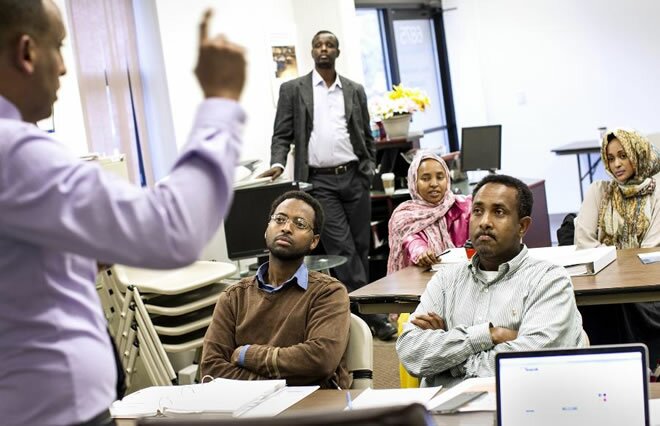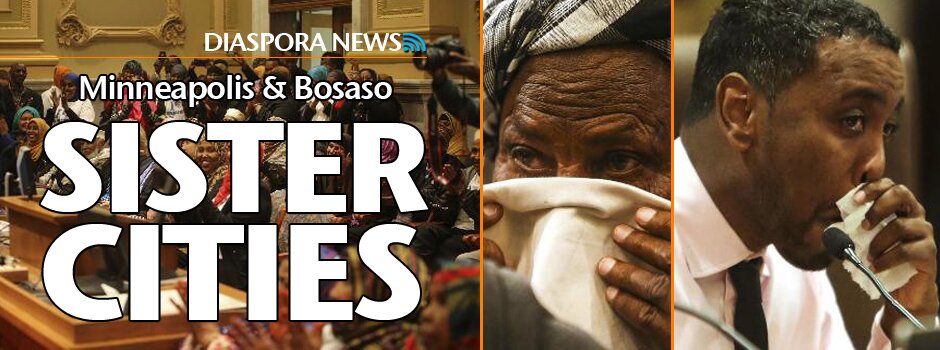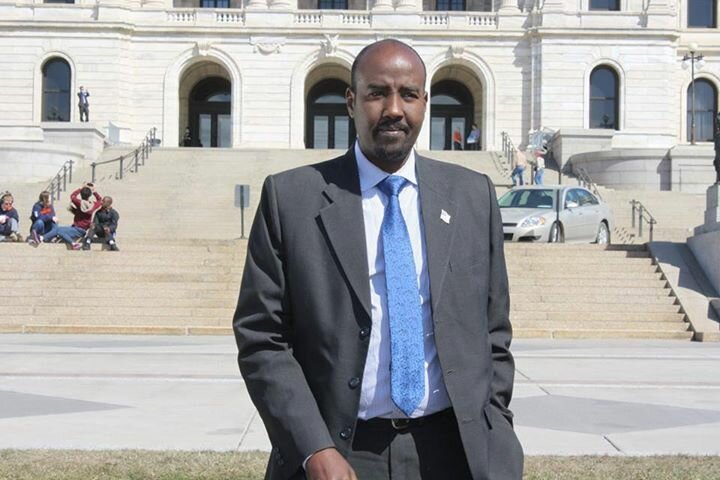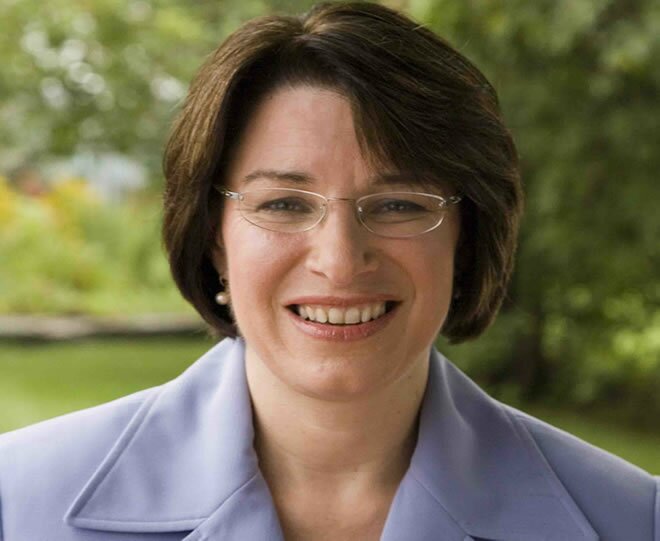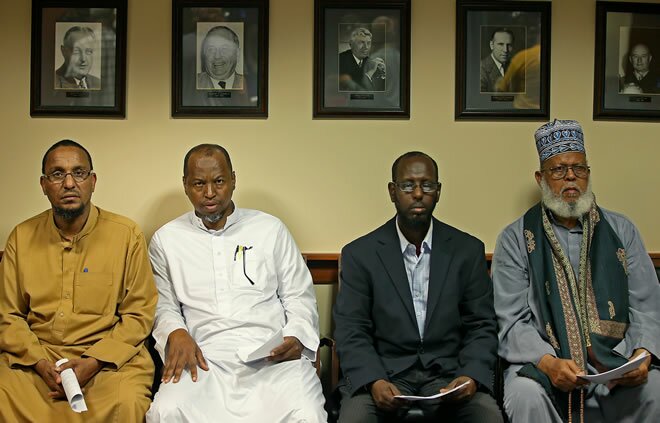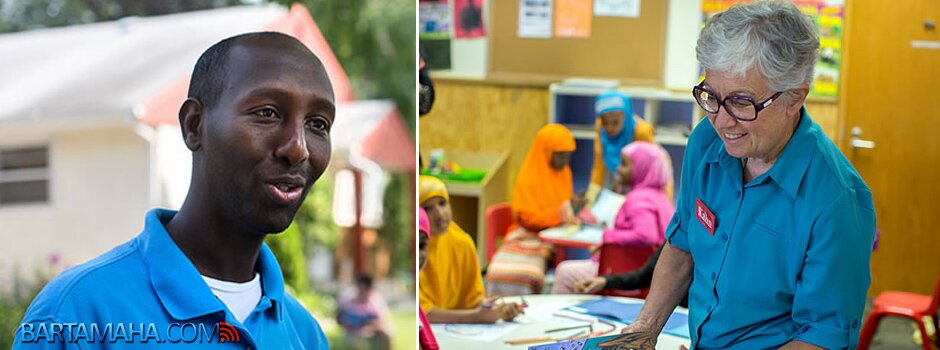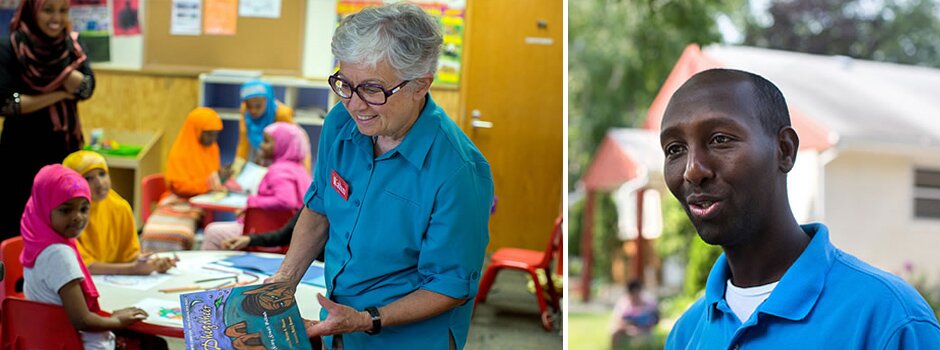The Somali autism puzzle ‘The western disease’ has hit immigrants’ kids hard and experts don’t know why
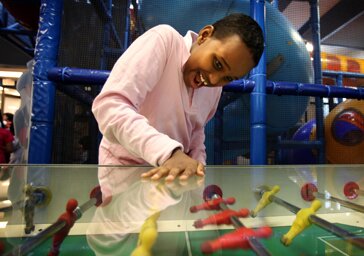
Mohamed Ali, 11 plays at a McDonald's indoor playground in Toronto. (Yvonne Berg for The Globe and Mail)
MARINA JIMÉNEZ –  Globe and Mail
Idar Hassan named her third child Ali, after a beloved cousin. Beautiful and alert, Ali could say “dada” and cruise around the living room, hanging onto furniture, by the time he was eight months old.
But a few months later, Ali’s mood became increasingly irritable. He stopped babbling and making eye contact, and would only drink milk. His big brown eyes often filled with tears as he raged in the corner of the room.
“He was miserable. I had to stay up all night with him, watching him walk in circles,” recalls Ms. Hassan, who immigrated to Toronto from Somalia in 1991. “It was like everything went black. The switch went off.”
Ms. Hassan sought answers from three different doctors until she was finally referred to a developmental pediatrician at North York General Hospital. Ali was diagnosed with autism.
In his case it was regressive, which means he inexplicably lost the speech and social skills he had learned as a baby.
Ali’s parents had never come across this condition back home in Kismayo, a city where children run in the streets and everyone knows everyone else’s business.
“In Somalia, we had kids with Down syndrome and cerebral palsy. But nobody had ever heard of autism,” Ms. Hassan recalls. “And believe me, it’s not something you can hide.”
In the past decade, Ms. Hassan, an articulate, elegant woman in a brown head scarf, long skirt and leather jacket, has met more than 30 Somali families in Toronto with one or more autistic children.
She has also given birth to another, her fourth child, Abshir.
The condition, which Somalis call the “western disease” or the “disease from abroad,” appears to have struck their community with a particular vengeance. While no data are available on prevalence, Somali parents in Canada are concerned enough to go public about what they say is a sleeping epidemic.
Autism affects about one in 150 Canadians, according to Health Canada, making it more common than childhood cancer, diabetes or AIDS.
Some experts doubt that the Somali community suffers from a higher rate of the condition. But neither Health Canada nor Statistics Canada track prevalence by ethno-racial group, making it impossible to scientifically validate the concerns of Somalis.
However, a higher-than-expected rate of autism among the children of Somali immigrants has been identified in two cities with large Somali communities: the Swedish capital of Stockholm, and Minneapolis, Minn. The issue was highlighted in a New York Times article last month, giving Canada’s Somali community hope that researchers here will take note.
“I have talked to about 100 Somalis in the Toronto area whose children are autistic. We don’t want to stigmatize the community, but we want to know why this is,” said Fatima Kediye, an instructor in Early Childhood Education at Ryerson University who did her masters thesis on the issue. She has compiled a huge dossier of studies on autism, and has been a lone academic voice of concern.
This month, the Autism Research Unit – based at Toronto’s Hospital for Sick Children and Bloorview Kids Rehab – will begin collecting data on the ethnic background of autistics as part of a network involving 15 sites in North America.
The network, says co-director Wendy Roberts, aims to improve the understanding of autism, a spectrum of developmental disorders that affect a person’s communication and social skills.
Between 20 and 100 genes are involved in autism, and some people have a genetic susceptibility, says Dr. Roberts, a developmental pediatrician.
In the case of Somalis, she speculates that there may be epigenetic causes – external factors that can activate or deactivate certain genes.
“They may be exposed to toxins, pesticides, environmental triggers or something in their diet, and that serves to turn off or on a gene function,” explains Dr. Roberts.
At the request of the Somali community in Minnesota, the U.S. Department of Health did a study last month that concluded Somali children are in pre-school programs for autism spectrum disorder at two to three times the rate of other children. Researchers couldn’t pinpoint why.
In the Swedish study, involving 17 children, the prevalence of autism was found to be three to four times higher in the Somali community than the non-Somali one. The paper, published last year in the journal Developmental Medicine & Child Neurology, suggested epigenetic factors could play a role.
Ms. Hassan and other Somali immigrants in Toronto remain convinced the condition is overrepresented among their own.
“Some of them think it is their fault for immigrating here,” said Ms. Kediye.
Many Somalis in Canada, who number 37,000 in all with about half living in Toronto, arrived as refugees and face language and cultural barriers.
Jonathan Alderson, a Toronto autism expert, said Somali families may need more specialized treatment to address a range of issues particular to children of immigrants, including the change in their traditional diet and family structure, cultural differences, and difficulties in getting a correct diagnosis.
In their own worlds
On a recent rainy Friday afternoon, Ali, now 12, and his brother Abshir, 11, stand around a foosball table inside a McDonald’s playground. With their closely cropped hair, lanky frames and sweet smiles, the brothers resemble one another.
They are joined by Mohamed Ali, who is 11 and also autistic. The trio exchange the occasional look, but remain for the most part locked in their own worlds, unable to converse or interact in any meaningful way. They squeal sometimes in delight at some private, hidden amusement until finally the playground’s ambient noise and fluorescent lights start to bother them. Flapping their arms and shouting, they make their impatience clear.
“I am used to people staring at Mohamed, but I don’t care. I take him everywhere,” says Idman Roble, Mohamed’s mother, an economist who immigrated 18 years ago. She and Ms. Hassan met through the Somali Parents Support Group. Their priority is to raise the profile of the condition – and to lobby for access to more services.
The media, they say, often publish stories of white, middle-class autistic children who have made progress through intensive therapy.
Actors Jenny McCarthy and Jim Carrey, for example, attribute the improvement in their son’s health to his special diet and applied behaviour analysis. (They also subscribe to the theory – now discredited – that early childhood vaccines may cause autism.)
Ms. Hassan can barely afford organic food, let alone speech therapy. Ali and Abshir attend special education classes at a public school – but it’s not enough.
Mohamed has 300 words, says Ms. Roble, and there are specialized communication devices with visual cues that could help him communicate. “But he needs one-on-one teaching, and we cannot afford it.”
She, like Ms. Hassan, must wash, dress and feed her son, hold his hand when they walk down the street, and watch him at all times. What will happen when these boys turn 18?
The stress of caring for two autistic children and one learning-disabled child already pushed one Somali mother over the edge. She had a nervous breakdown and had to temporarily relinquish her kids to the Children’s Aid Society.
Ms. Hassan and Ms. Roble vow to fight on. “We can’t regret what we have. There are always others who suffer more,” says Ms. Hassan. “But we need help.”
Comments
comments
 Calendar
Calendar











